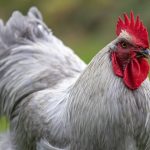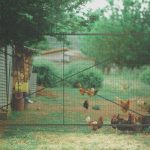Chickens are susceptible to various diseases that can significantly impact poultry farming. Common chicken diseases include Newcastle disease, infectious bronchitis, avian influenza, coccidiosis, and Marek’s disease. Newcastle disease is a highly contagious viral infection affecting chickens’ respiratory, nervous, and digestive systems, often resulting in high mortality rates.
Infectious bronchitis, another viral disease, primarily impacts the respiratory system and can lead to decreased egg production and quality. Avian influenza is a highly contagious viral infection causing severe respiratory and digestive symptoms, potentially leading to high mortality rates in infected flocks. Coccidiosis, a parasitic disease caused by protozoa, affects chickens’ intestinal tracts, resulting in diarrhea, weight loss, and reduced egg production.
Marek’s disease is a viral infection targeting the nervous system, causing paralysis and tumors in various organs. Poultry farmers must understand the symptoms and transmission methods of these diseases to prevent and control outbreaks effectively. Common signs of illness in chickens include respiratory distress, diarrhea, decreased egg production, and neurological symptoms.
Diseases can be transmitted through direct contact with infected birds, contaminated equipment, or wild birds. Implementing biosecurity measures and regularly monitoring flock health are crucial for preventing the introduction and spread of diseases in poultry operations. By staying informed about common chicken diseases and maintaining vigilance, poultry farmers can minimize the impact of these diseases on their flocks and overall production.
Table of Contents
- 1 Implementing proper hygiene and sanitation practices
- 2 Providing a balanced and nutritious diet
- 3 Regular health check-ups and vaccinations
- 4 Creating a stress-free environment for chickens
- 5 Managing the flock’s living conditions
- 6 Seeking professional advice and support
- 7 FAQs
- 7.1 What are some common illnesses that chickens can get?
- 7.2 How can I prevent my chickens from getting sick?
- 7.3 What are some signs that my chickens may be sick?
- 7.4 What should I do if I suspect my chickens are sick?
- 7.5 Can I vaccinate my chickens to prevent illness?
- 7.6 Are there any natural remedies to keep chickens healthy?
Key Takeaways
- Common diseases in chickens include respiratory infections, coccidiosis, and Marek’s disease
- Proper hygiene and sanitation practices are essential to prevent the spread of diseases in chicken flocks
- A balanced and nutritious diet is crucial for the overall health and well-being of chickens
- Regular health check-ups and vaccinations are necessary to prevent and control diseases in chickens
- Creating a stress-free environment and managing living conditions can help improve the health and productivity of chicken flocks
- Seeking professional advice and support from veterinarians and poultry experts is important for maintaining the health of chicken flocks
Implementing proper hygiene and sanitation practices
Regular Cleaning and Disinfection
Regular cleaning and disinfection of the chicken coop, nesting boxes, feeders, and waterers can help eliminate pathogens and reduce the risk of disease transmission within the flock.
Removing Litter and Waste Material
Removing litter and waste material from the coop on a regular basis can help prevent the buildup of harmful bacteria and parasites that can compromise the health of the chickens. Maintaining a dry and well-ventilated environment in the chicken coop can help reduce the risk of respiratory infections and other health issues.
Handling Eggs and Poultry Products
Proper hygiene and sanitation practices also extend to the handling of eggs and poultry products. Keeping eggs clean and refrigerated can help prevent the growth of bacteria and reduce the risk of foodborne illnesses. Proper handwashing and sanitation practices when handling chickens and their products can also help prevent the spread of diseases to humans. By implementing these hygiene and sanitation practices, poultry farmers can create a clean and healthy environment for their chickens, reducing the risk of disease outbreaks and promoting the overall well-being of their flocks.
Providing a balanced and nutritious diet

A balanced and nutritious diet is essential for maintaining the health and productivity of chickens. A well-balanced diet should provide chickens with the necessary nutrients, including protein, carbohydrates, fats, vitamins, and minerals, to support their growth, egg production, and overall health. Protein is essential for muscle development and egg production in chickens, while carbohydrates provide energy for daily activities.
Fats are important for maintaining healthy skin and feathers, as well as providing a concentrated source of energy. Vitamins and minerals play crucial roles in various physiological processes in chickens, such as bone development, immune function, and eggshell formation. In addition to providing a balanced diet, it is important to ensure that chickens have access to clean and fresh water at all times.
Water is essential for maintaining proper hydration, regulating body temperature, and supporting various physiological functions in chickens. Dehydration can lead to decreased egg production, poor growth, and increased susceptibility to diseases. By providing a balanced and nutritious diet along with access to clean water, poultry farmers can support the health and well-being of their flocks, leading to improved productivity and overall performance.
Regular health check-ups and vaccinations
Regular health check-ups and vaccinations are important components of a comprehensive disease prevention program for chickens. Routine health checks allow poultry farmers to monitor the overall health and well-being of their flocks, identify any signs of illness or disease early on, and take appropriate measures to address any health issues. During health check-ups, farmers should pay attention to the chickens’ behavior, appearance, feed consumption, egg production, and any signs of illness or abnormality.
By conducting regular health checks, farmers can detect potential health problems early on and take proactive measures to prevent disease outbreaks in their flocks. Vaccinations are an important tool for preventing infectious diseases in chickens. Vaccines can help stimulate the chickens’ immune system to produce protective antibodies against specific pathogens, reducing the risk of infection and disease.
Common vaccines for chickens include those for Newcastle disease, infectious bronchitis, avian influenza, Marek’s disease, and coccidiosis. By following a vaccination schedule recommended by a veterinarian or poultry health professional, farmers can protect their flocks from these common diseases and minimize the impact of outbreaks on their operations. Regular health check-ups and vaccinations are essential components of a proactive approach to disease prevention in poultry farming.
Creating a stress-free environment for chickens
Creating a stress-free environment is essential for promoting the health and well-being of chickens. Stress can have negative effects on the immune system of chickens, making them more susceptible to diseases and reducing their overall productivity. Common sources of stress for chickens include overcrowding, poor ventilation, extreme temperatures, inadequate nutrition, social hierarchy within the flock, predation, and handling or transportation.
By addressing these stressors and creating a comfortable and safe environment for chickens, farmers can help reduce the risk of disease outbreaks and promote the overall welfare of their flocks. Providing adequate space for chickens to move around freely, ensuring proper ventilation in the chicken coop, maintaining comfortable temperatures, providing a balanced diet, minimizing disturbances within the flock, and protecting chickens from predators are all important measures for creating a stress-free environment. Additionally, handling chickens gently and minimizing unnecessary stress during routine management practices can help promote their overall well-being.
By creating a stress-free environment for chickens, farmers can help reduce the risk of disease outbreaks and support the overall health and productivity of their flocks.
Managing the flock’s living conditions

Creating a Comfortable Environment
Nesting boxes should be clean and comfortable to encourage hens to lay eggs in a suitable environment. In addition to managing the physical living conditions of the flock, it is important to consider social dynamics within the flock. Chickens have a social hierarchy within their groups, with dominant individuals establishing pecking orders.
Minimizing Aggressive Behavior
Providing enough space for all birds to move around freely can help minimize aggressive behavior within the flock. Additionally, introducing new birds into an existing flock should be done carefully to minimize stress and aggression among birds.
Reducing Disease Risk and Promoting Well-being
Proper management of the flock’s living conditions can help create a comfortable and safe environment for chickens, reducing the risk of disease outbreaks and promoting their overall well-being.
Seeking professional advice and support
Seeking professional advice and support from veterinarians or poultry health professionals is essential for maintaining the health of chicken flocks. These professionals can provide valuable guidance on disease prevention strategies, vaccination programs, nutrition management, biosecurity measures, and overall flock management practices. By consulting with experts in poultry health, farmers can stay informed about best practices for maintaining the health and well-being of their flocks.
In addition to seeking professional advice on preventive measures, it is important to consult with veterinarians or poultry health professionals when dealing with potential disease outbreaks or health issues within the flock. These professionals can help diagnose illnesses, prescribe appropriate treatments or medications, and provide guidance on managing disease outbreaks effectively. By seeking professional advice and support when needed, poultry farmers can ensure that they are taking proactive measures to protect their flocks from diseases and promote their overall health and productivity.
In conclusion, understanding common diseases in chickens is crucial for preventing outbreaks in poultry flocks. Implementing proper hygiene and sanitation practices can help create a clean environment that reduces the risk of disease transmission. Providing a balanced diet along with regular health check-ups and vaccinations supports the overall health and productivity of chicken flocks.
Creating a stress-free environment by managing living conditions promotes the well-being of chickens. Seeking professional advice and support from veterinarians or poultry health professionals ensures that farmers have access to expert guidance on maintaining flock health. By following these best practices for disease prevention in poultry farming, farmers can protect their flocks from common diseases and promote their overall welfare.
If you’re looking for tips on how to keep your chickens healthy and disease-free, you might want to check out this article on Snaplock Chicken Coop. It provides valuable information on how to maintain a clean and safe environment for your chickens, which is essential for preventing illnesses.
FAQs
What are some common illnesses that chickens can get?
Some common illnesses that chickens can get include respiratory infections, coccidiosis, Marek’s disease, and avian influenza.
How can I prevent my chickens from getting sick?
You can prevent your chickens from getting sick by providing them with a clean and dry living environment, ensuring they have access to fresh water and a balanced diet, and practicing good biosecurity measures.
What are some signs that my chickens may be sick?
Some signs that your chickens may be sick include decreased egg production, lethargy, loss of appetite, abnormal droppings, and respiratory symptoms such as coughing or sneezing.
What should I do if I suspect my chickens are sick?
If you suspect your chickens are sick, it is important to isolate the affected birds, consult with a veterinarian who is experienced in poultry health, and follow their recommendations for treatment.
Can I vaccinate my chickens to prevent illness?
Yes, there are vaccines available for some common poultry diseases such as Marek’s disease and avian influenza. Consult with a veterinarian to determine the appropriate vaccination schedule for your flock.
Are there any natural remedies to keep chickens healthy?
Some natural remedies to keep chickens healthy include adding apple cider vinegar to their water to boost their immune system, providing them with garlic or herbs in their diet, and using diatomaceous earth to control parasites. However, it is important to consult with a veterinarian before using any natural remedies.
Meet Walter, the feathered-friend fanatic of Florida! Nestled in the sunshine state, Walter struts through life with his feathered companions, clucking his way to happiness. With a coop that’s fancier than a five-star hotel, he’s the Don Juan of the chicken world. When he’s not teaching his hens to do the cha-cha, you’ll find him in a heated debate with his prized rooster, Sir Clucks-a-Lot. Walter’s poultry passion is no yolk; he’s the sunny-side-up guy you never knew you needed in your flock of friends!







